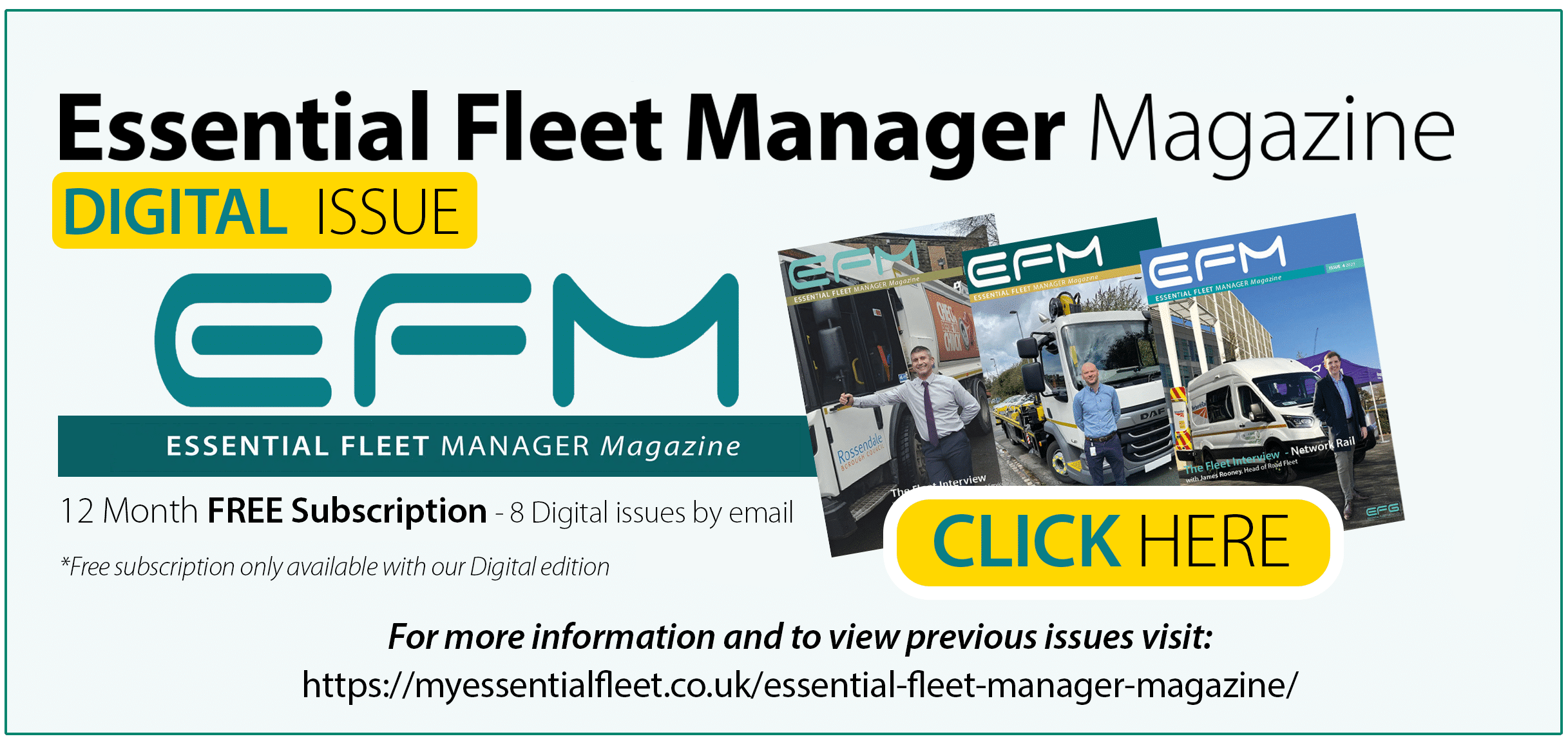By: Deborah Cheadle, Publisher, Essential Fleet Group Ltd.
How best to achieve efficiency whilst staying compliant
The Challenges within fleet management
As a fleet or transport manager, managing your fleet of vehicles is a complex challenge, especially in today’s dynamic and evolving landscape.
Effective fleet management is critical for both a smooth operation of the day-to-day activities of your organisation and to lessen the impact of rising costs for your organisation as a whole.
Within a medium to large organisation, the vehicle fleet can also be the most significant cost that needs to be budgeted for, so procurement strategy throughout must be rigorously designed to balance the need for the right products and services, at the right time, with the most efficient form of funding for your needs.
Fleet management systems should be robust and automated
Technology and automated processes within fleet management are essential for effective fleet management. These systems can provide real-time data on vehicle location, fuel usage, maintenance schedules, and driver behaviour. The data provided allows a fleet or transport manager to make informed decisions and to drive improvements in overall fleet efficiency.
Data, correctly used, will not only inform the steps needed to improve driver and vehicle safety and efficiency, but also how fleet operations can better meet the needs of each department within an organisation.
As a single example, the HR Department may be prioritising employee wellbeing and sharing fleet driver data can be a significant help.
Implementing an automated system streamlines operations and provides valuable insights into fleet performance. This data-driven approach enables fleet managers to identify patterns, predict maintenance needs, and make proactive decisions to reduce downtime and extend vehicle life. Essentially, data led fleet management tools will provide vital data for both real-time operational needs and predictive data that manages Service, Maintenance and Repair routines and systems.
There is also an increasing awareness of the value of fleet data in underpinning legal defences when the operator’s vehicle has been involved in an incident. Clearly, when data can prove that a driver’s behaviour is not at fault, or, for example, the vehicle was not at the incident location, legal defence is straight forward.
Prioritise vehicle maintenance
Regular vehicle maintenance is essential to extending the life of your fleet vehicles and therefore in turn ensuring their reliability and safety. If your fleet is well-maintained is less likely to encounter breakdowns, leading to reduced downtime and repair costs.
Implementing a preventive maintenance program for each vehicle, which includes regular checks and servicing, will save you money in the long run.
Data as mentioned above, is now an important part of managing vehicle maintenance and can also demonstrate that a vehicle is properly maintained and is regularly checked if vehicle defects are a probable cause of an incident.
Rigorous adherence to standard maintenance and service schedules should be considered a minimum requirement for all fleet vehicles.
In addition, engaging with your drivers and training them to perform basic vehicle checks and to report any issues promptly, will not only encourage a greater sense of responsibility towards the vehicles they drive, but it will also help in the early detection of any potential issues.
There are now Apps available that allow full vehicle pre-use checks to be carried out remotely with information fed back to the fleet team. Again, the best of these apps will strengthen the legally defensible position of the operator if an incident may be the result of a vehicle defect.
The importance of driver training
Drivers underpin your fleet operation, and if there are any issues with their performance, it will directly impact your fleet’s efficiency and safety.
It is essential therefore to carry out regular assessments to ensure that your drivers are equipped with the necessary skills and knowledge.
Driver Training should be offered for all new vehicles entering your fleet. On a more general basis, all drivers should be made aware of safe driving practices, efficient route navigation, and offered a refresher on compliance. Ideally you are trying to instil a culture of safety.
The use of telematics data allows fleet managers to identify key areas for improvement by gaining insights into driving habits. Driver Training can then be targeted towards individual drivers who flag up ‘safety concerns’.
Monitoring driver performance through telematics data can also identify exemplary performance. Encouraging a culture of safety and efficiency among drivers not only enhances fleet operations but will also contribute to the overall well-being of your drivers.
There is an increasing trend for and momentum towards a “carrot” rather than “stick” approach with the safest and most efficient driver behaviour being rewarded and recognised through prizes that might be financial, gift based or even extra leave. It is worth fleet managers looking at which sort of reward might provide the best motivation for drivers and at the same time, not looking for ways to “punish” drivers who display issues.
In some sectors, such as Social Housing Maintenance, most fleet drivers are employed as, for example, electricians or joiners. This can lead to a culture where there is a great deal of focus on how they perform in their key role, but a lack of focus on their other day to day responsibility to drive safely and efficiently. Therefore, fleet teams need to communicate to other departments within an organisation that anybody, whatever their key role, if they are driving for work then they must be scrutinised and managed as fleet drivers.
Ensure your fleet is Compliant with Regulations
Staying compliant is not an optional choice within fleet management. You are required to meet regulations, such as, those that cover vehicle emissions, safety standards, and driver working hours.
Staying updated with any changes in transport law and industry standards is crucial for maintaining high operational standards.
Non-compliance can result in legal and financial penalties, which can be detrimental to your organisation.
On larger vehicles, there is a substantial amount of legislation that must be complied with to retain the organisation’s ‘O’ Licence. As a golden rule, the principals that underpin compliance with ‘O’ Licence regulations, should also be applied to operating Van fleets.
Even though regulation is far less stringent when it comes to operating vans, if the ‘O’ License principals are applied, van fleets will by default be compliant and operated in as safe and efficient manner as possible.
Take time to optimise your vehicle fleet mix
It is vital to analyse and map out vehicle usage within your fleet mix to ensure it meets the needs of your organisation. If you have got it right, your fleet should have the right number and type of vehicles, to meet demand.
Are your vehicles fit for purpose and utilised correctly? Having over-sized vehicles may be prove to be an unnecessary expense and so are vehicles that are rarely used. It is therefore good practice to regularly assess your fleet composition to find out whether for example if it would be cheaper to hire a specialist vehicle that is rarely used rather than committing capital spend that could be used more effectively elsewhere.
It is critical when selecting the right vehicles that there is effective communication between user departments, fleet teams, finance and procurement.
In complex organisations it is very difficult to ensure that the needs of all departments are met. For example, as said above, an oversized vehicle can be an unnecessary expense. However, so is an undersized vehicle if, for example, multiple journeys are being made when fewer would be needed with the right sized vehicle.
Maintenance of older vehicles – knowing when it is best to replace
Older vehicles on your fleet could be costing your organisation excessive and escalating maintenance costs, increasing vehicle downtime.
Decisions on vehicle replacement should be based on an analysis of maintenance costs, vehicle performance, and the evolving needs of your organisation in general.
Most often, vehicles that are outright purchased will be “written-down” over a specific amount of time. If vehicles are planned for disposal in this way, then the operator has the opportunity to engage with an expert remarketing organisation for “de-fleeting” and gaining the best possible return and at the same time, so long as there has been sustained engagement with suppliers, plan the on-fleeting of new vehicles at the correct time.
Addressing environmental concerns
Environmental concerns and how they are addressed is an important topic within fleet management. Whether that is shown via the adoption alternative fuels to petrol or diesel or transitioning to a fully electric fleet, it is vital in that to meet requirements it is done in a way that achieves value for money and that benefits not only the organisation, but also society as a whole.
Some operators call this approach “People, Pocket, Planet”, where the case for fleet electrification is built around wellbeing benefits for the drivers, financial benefits for the business and, of course, environmental benefits.
In recent years, as fleet decarbonisation is no longer optional, addressing and meeting targets to achieve net -zero have brought increased pressure on fleet and transport managers.
Consideration of meeting these targets must be given in many transport or fleet procurement decisions. Many organisations, who have a number of company car drivers, have implemented procurement policies based purely on emissions, along with implementing eco-friendly driving practices and route optimisation which can also contribute greatly to sustainability efforts.
Van fleets are increasingly being electrified as the capabilities of vehicles and availability increases and there are an increasing number of low or even zero emission options on the market for heavier vehicles.
It is worth mentioning here that HVO (Hydrolysed Vegetable Oil) rewards the operating organisation with significant reductions in emissions, with no modifications needed to diesel vehicles.
Keeping your Fleet Management strategies on track
As with any type of management task, changes in emerging technologies can cause throw up issues. Taking time to regularly review and adjust your fleet management strategies is essential for staying ahead of these changes.
Regularly analysing fleet performance, staying informed about industry trends, and being open to adopting new technologies and practices can drive continuous improvement and success in fleet management.
When undergoing a fleet replacement programme, problems in the supply chain that have a diverse range of causes and are set to continue, can be offset by effective and constant communication with suppliers. Good suppliers will be able to keep you informed every step of the way and be able to offer alternatives or solutions where possible.
In summary
Effective fleet management is integral to the success of any organisation that relies on its vehicle fleet. By implementing robust fleet management systems, ensuring regular maintenance, managing fuel and drivers efficiently, staying compliant, right-sizing your fleet size, adopting sustainable practices, and continuously reviewing and adapting strategies, as a fleet or transport manager, you can navigate the complexities of fleet management.
Data over-load can be a real problem. Using and reporting using fleet management software will help not only to free up more time for other management tasks, but will ensure that the data produced by your fleet activity is interpreted correctly and in a more effective way.
By incorporating data-led technologies into your fleet management processes it will improve your management of:
- Maintenance and repair scheduling of your fleet vehicles, and other assets
- Workshop inspections, defect reporting and audits
- Inventory control
- Analysis of fuel use and emissions
- Vehicle use
- Fleet performance
- Risk management
- Driver licence checks
- Regulatory and legal compliance
- Budgets and forecasting




